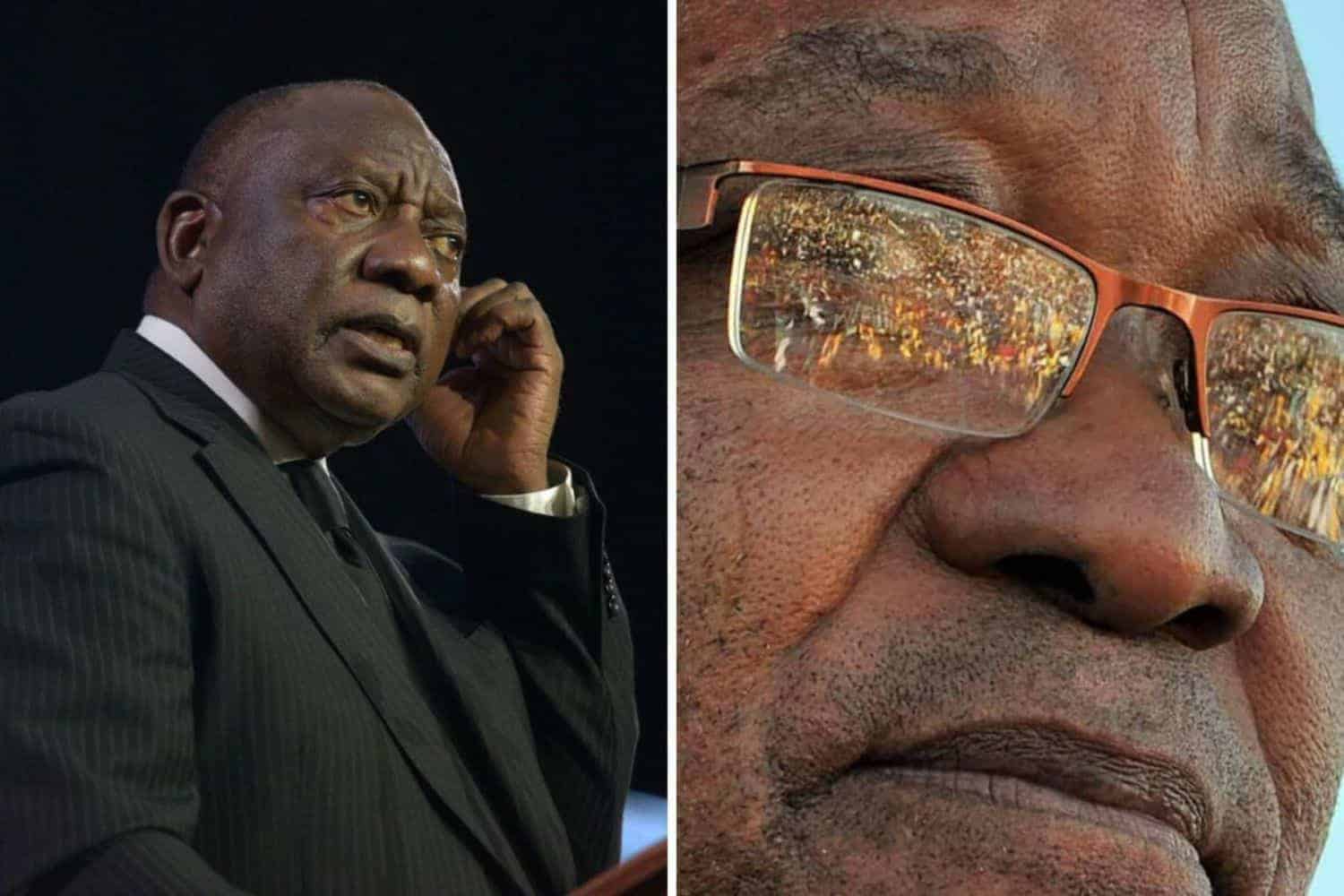Jacob Zuma and the MK party are seeking to invalidate President Cyril Ramaphosa’s decision to place Senzo Mchunu on a leave of absence and appoint Feroz Cachalia.

Another battle is expected to play out in the Constitutional Court as the MK party and its leader, former president Jacob Zuma, challenge President Cyril Ramaphosa’s decision to place Minister of Police Senzo Mchunu on special leave and appoint Wits law professor Feroz Cachalia as acting police minister.
The apex court has agreed to hear the matter on Wednesday, 30 July.
MK party application
Jacob Zuma and the MK party are seeking to invalidate Ramaphosa’s decision to place Mchunu on a leave of absence and appoint Wits law professor Firoz Cachalia as acting police minister.
Zuma said Ramaphosa “openly dodges” the clear distinction between the power to appoint a minister and the different power to appoint an acting minister.
Cachalia appointment
In the head of arguments filed at the Constitutional Court this week, Ramaphosa defended his decision to place Mchunu on a leave of absence and appoint Cachalia, saying it is to protect the integrity of law enforcement agencies and to safeguard public trust.
He justified the additional expenditure in appointing Cachalia as necessary to maintain the legitimacy and integrity of the criminal justice system during the investigation into the serious allegations against Mchunu.
ALSO READ: Here’s why Zuma’s MK party wants Ramaphosa removed in ‘urgent’ motion of no confidence
“I acknowledge that the appointment of Professor Cachalia as the acting minister of police, pending the outcome of the investigation by the commission of inquiry, has cost implications.
“The expenditure of additional resources for the appointment of a person from outside Cabinet could, however, only be avoided by assigning Minister Mchunu’s powers and functions to an existing minister (or to appoint a deputy minister as a minister to enable such assignment),” Ramaphosa said.
Cost
Ramaphosa added that Cachalia is meant to hold this position for the duration of the commission of inquiry, which is intended to complete its work with the “urgency that it deserves, and in a maximum of six months.”
“It was based on these considerations that, mindful of the expenditure associated with the appointment of Professor Cachalia, I deemed this expenditure justifiable in the circumstances to maintain the legitimacy and integrity of the criminal justice system.”
Mchunu
In the MK party’s papers, Zuma argued there was no express constitutional power allowing Ramaphosa to impose special leave on Mchunu.
“There is nothing said in the president’s affidavit which justified placing Minister Mchunu on ‘special leave’ and thereby causing him to retain his ministerial title, salary and other perks or privileges at the expense of the long-suffering taxpayer.”
Leave of absence
However, Ramaphosa denied in the “strongest terms” that his decision to place Mchunu on special leave rather than dismissing him amounted to special treatment of an ally.
“This allegation is based on pure speculation and conjecture. I deny it in the strongest terms. I have dealt with Minister Mchunu in accordance with my constitutional powers, having exercised my judgment regarding the appropriate course of action to adopt in the particular circumstances of this case.
“Far from revealing bias on my part, the establishment of a commission of inquiry into the allegations reveals the seriousness with which I take the allegations against Minister Mchunu,” Ramaphosa said.
Implications
Ramaphosa, in his heads of argument, said the urgent application initiated by Zuma directly to the Constitutional Court without approaching lower courts will have “far-reaching and punishing consequences” for the apex court.
“Despite this, the Court has been asked by the applicants to convene itself on hyper urgent timelines, and to determine alone, and finally, the meaning of constitutional provisions that will have far-reaching consequences for the exercise of power by the President well into the future.
ALSO READ: Ramaphosa appoints Gwede Mantashe as acting police minister
“It will also have far-reaching and punishing consequences for this Court because if it concludes that this case engages its exclusive jurisdiction, then all cases involving Cabinet reshuffles and arguments that the President has in some or other way not upheld and defended the Constitution will come to this Court without first going before any other court. The implications for this Court’s overburdened workload and its developing jurisprudence will be profound,” Ramaphosa said in his heads of argument.”
Madlanga commission
Ramaphosa’s papers also deal with his decision to establish a commission of inquiry.
While Zuma does not oppose the idea of a commission itself – and agrees it may be necessary – what he challenges is the appointment of a judge (Justice Mbuyiseli Madlanga) to chair it, given that the judiciary is among the institutions implicated by Mkhwanazi.
However, Ramaphosa disputes this.
“First, the applicants allege that the President’s decision is reviewable because it requires Justice Madlanga to ‘potentially investigate himself’. However, there is no evidence whatsoever that Justice Madlanga is implicated in any of the allegations of illegality that fall within the Madlanga Commission’s terms of reference,” Ramaphosa said.
“The allegations of impropriety do not pertain to justices of the Constitutional Court, and relate to criminal proceedings. No reasonable apprehension of bias can be said to arise at this stage. Even if Justice Madlanga allegedly became conflicted while the Madlanga Commission conducted its investigations, those allegations and any conflict of interest can be dealt with then.
“The very remote possibility of that conflict arising does not mean the entire Madlanga Commission cannot proceed—certainly not when the Madlanga Commission’s mandate extends beyond allegations of impropriety against judicial officers,” Ramaphosa argued.
Relief
The MKP wants the court to decide urgently on the matter because Cachalia will assume office on 1 August.
However, Ramaphosa argued a case has not been made by the MK party.
“In their heads of argument, the applicants say that they may request interim relief at the hearing of this matter. But the terms of this interim relief do not appear anywhere in the notice of motion, are undefined, and no proper case has been made out for it in the founding papers. No such interim relief should therefore be granted on any basis”.
Ramaphosa said even if the MK party establish some ground of review, the proper remedy would be “remittal and not substitution”, adding that the apex court cannot act instead of the President in the appointment and removal of ministers.
ALSO READ: MK party slams Ramaphosa over missed Mandela Day deadline
Support Local Journalism
Add The Citizen as a Preferred Source on Google and follow us on Google News to see more of our trusted reporting in Google News and Top Stories.








